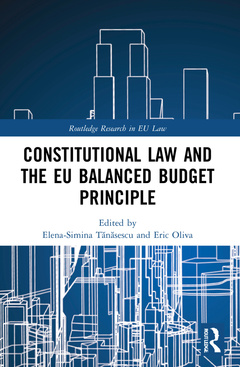Constitutional Law and the EU Balanced Budget Principle Routledge Research in EU Law Series
Coordonnateurs : Tănăsescu Elena-Simina, Oliva Eric

Exploring the balanced budget rule as an economic standard and as a legal principle, this book explains the context and content of the balanced budget rule and presents a critical appraisal of its impact on legal systems, political institutions and social values, and particularly an evaluation of its constitutionalization in the European and national legal systems.
Examining a range of perspectives on the balanced budget rule as a legal principle, a series of chapters investigate the feasibility and effectiveness of the balanced budget rule. The book considers the impact this may have on the separation of powers within the state, on democratic decision-making, on the European social model and on the protection of fundamental social rights within the European Union. It suggests that this impact goes beyond the ethical issue of the public debt considered as a burden placed on future generations, and beyond injunctions imposed by international financial institutions on national public finances. The transfiguration of fiscal discipline from an economic requirement into a legal rule demanding a balanced budget embodies a challenge to the political nature of the budgetary process while creating the flexibility needed in order to further fiscal federalism within the European Union.
This book argues that the balanced budget rule is nothing more than it has always been: an instrument for devising public policies in a rational manner, a tool for conceiving qualitative choices regarding the well-being of citizens.
Introduction - Balanced budget rule and/in the Law
Eric Oliva, Elena-Simina Tanasescu
Part I: Balanced Budget as Normative and Economic Standard
Chapter 1: Balanced budget as a substantive legal rule
- Gilbert Orsoni
Chapter 2: On the economic concept of a balanced budget
- Thomas Stauffer
Part II: Balanced Budget as Constitutional Rule
Chapter 3: The German Debt Brake
- Ralph Schenke
Chapter 4: The Constitutional stakes of the "golden rule"
- Marc Verdussen
Part III: Balanced Budget and Separation of Powers
Chapter 5: Balanced budget rule and representative democracy
- Giulia Aravatinou Leonidi
Chapter 6: The Financial Local Autonomy – A Tale of Balanced Budgets and Vertical Separation of Financial Power
- Simona Gherghina
Chapter 7: Balanced budget rule and the transversality of agencies
- Bogdan Iancu
Part IV: Balanced Budget, Governance and Fundamental Rights
Chapter 8: Balanced budget rule and social rights
- George Katrougalos, Daphne Akoumaniaki
Chapter 9: The organizational foundations the IMF’s doctrinal turn on fiscal policy after the Great Recession
- Cornel Ban
Final remarks - Balanced Budgets: the Vanity of a Principle
Michel Bouvier
Elena-Simina Tănăsescu is Professor of Law at the University of Bucharest, Romania.
Eric Oliva is Professor of Public Finance at Aix-Marseille Université, France.
Date de parution : 01-2024
15.6x23.4 cm
Date de parution : 11-2021
15.6x23.4 cm
Thèmes de Constitutional Law and the EU Balanced Budget Principle :
Mots-clés :
Fiscal Compact; Balanced Budget Rule; TSCG; EU Governance; European Fiscal Compact; Fiscal Compact Treaty; golden rule; Debt Brakes; balanced budget; TFEU; European sovereign debt crisis; Eurozone crisis; Euro Area; Member States; Charter of Fundamental Rights; EU Member State; Constitution; European Stability Mechanism; Public Administrations; Global Financial Crisis; Fiscal Rules; Legal challenge; Gdp Threshold; Excessive Deficit Procedure; Budgetary Discipline; Fiscal Space; EU Law; Structural Deficit; Keynes; National Parliaments; Stability Council; Central Government; Potential Gdp; European Economic Governance



